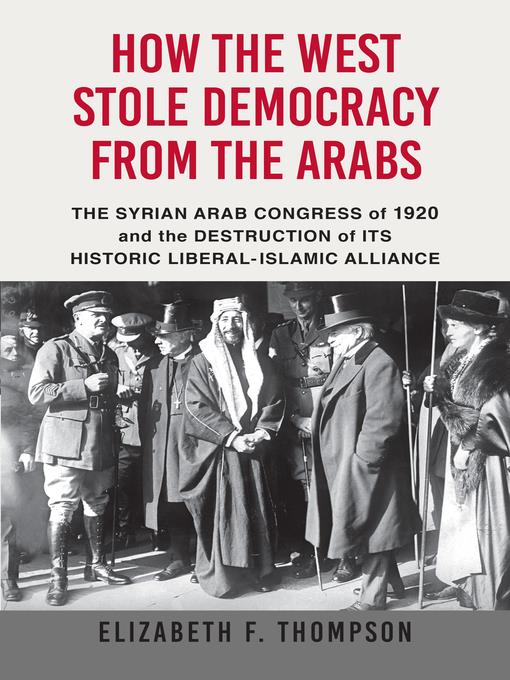
How the West Stole Democracy from the Arabs
The Arab Congress of 1920, the destruction of the Syrian state, and the rise of anti-liberal Islamism
فرمت کتاب
ebook
تاریخ انتشار
2020
نویسنده
Elizabeth F. Thompsonناشر
Grove Atlanticشابک
9780802148216
کتاب های مرتبط
- اطلاعات
- نقد و بررسی
- دیدگاه کاربران
نقد و بررسی

March 2, 2020
Historian Thompson (Colonial Citizens) delivers an exhaustive recounting of the short-lived Syrian Arab Kingdom (comprised of the modern states of Israel, Jordan, Lebanon, Palestine, and Syria) and its betrayal by Western powers. Drawing on Arabic-language sources, Thompson documents the Arab Revolt that overthrew the Ottoman Empire during WWI, the Paris Peace Conference, the politicking of Allied leaders during the creation of the League of Nations, and the March 1920 declaration of a free Syrian state under revolutionary leader Prince Faisal. She describes the importance of democratic ideals of freedom and self-determination to Arab leaders, including Islamic reformer Sheikh Rashid Rida, and argues that Woodrow Wilson’s death and America’s withdrawal from the international stage following WWI allowed England and France to assert their colonial aspirations over the Middle East. Claiming that Syria was not a sovereign nation, “but rather a collection of various ‘Arabic-speaking peoples,’ ” France invaded in July 1920. Syria’s dismal military response left Faisal little choice but to surrender, according to Thompson. She wades deep into the minutiae of congressional meetings and declarations, but succeeds in making the case that the West’s betrayal of Syria set the stage for a century of regional strife. This expertly researched account brings to life a meaningful but underexplored chapter in world history.

March 1, 2020
An impassioned argument that the Arabs of Greater Syria who fought for the Allies in World War I, deeply committed to the Wilsonian notion of self-determination, were robbed of their chance at democracy. Thompson, the Mohamed S. Farsi Chair of Islamic Peace at American University, claims that this tragic story of Syria's occupation by England and France--and their deliberate effort to "destroy the Syrian Arab state" just as it was forming its democratic constitution--has "never before been told in English." She notes that only four books have covered the Syrian Arab Congress and its drafting of a "147-article constitution modeled on its Ottoman predecessor with modifications inspired by American federalism and checks and balances"--a document created within the slim window between the declaration of Syrian independence and the imperial partition of Syria as agreed upon at the San Remo Conference in April 1920. Beginning in 1916, Prince Faisal, the championed leader of the Arab revolt against the Ottoman Empire who was famously advised by T.E. Lawrence, defied his father in advocating for Syrian independence. Yet with Woodrow Wilson incapacitated by stroke, English and French leaders, using the League of Nations system of mandates as pretext, declared Faisal's government illegal. The author clearly demonstrates how they planned the occupation and partition just as a remarkable coalition of liberals and religious leaders agreed on a system protecting minorities to "balance freedom and rule of law." In a book sure to interest students of Middle Eastern history, particularly in the 20th century, Thompson fashions an original, authoritative study, laying out the process of the "theft" of Syrian democracy. "The history of postwar Syria," she writes, "reveals that the tragedy of the 1919 [Paris Peace] conference was due not to the oversight of a few exhausted and old-fashioned statesmen, but rather to their vigorous effort to expand a colonial and racialist world system." Bitter lessons from the past unearthed and expertly reexamined.
COPYRIGHT(2020) Kirkus Reviews, ALL RIGHTS RESERVED.

March 1, 2020
After World War I, Syrian nationalists, who previously fought to preserve their lands from Ottoman control, declared the country's independence in 1920, and proclaimed Faisal Hussein as king of Syria. In response, French and British forces imposed imperial control throughout the region. Thompson (American Univ. Sch. of International Service) brings together British, French, Syrian, and American archives to lay out Arab actions to establish an independent constitutional monarchy. After detailing French undertakings to maintain control of Syria by military force and diplomatic duplicity, Thompson analyzes the extensive negotiations involved in Syria finally being recognized as a sovereign state in 1946, creating vivid portraits of leading diplomatic and military figures of the time. She contends that the European extinction of Syrian liberal, secular representative government is responsible for the authoritarian, sectarian rule in parts of the Arab world today. This clearly written, detailed study of post-World War I diplomacy sheds insight into the Syrian struggle for self-rule, and shows how the legacy of imperialism and colonialism continues to endure throughout the years. VERDICT Highly recommended for history buffs and readers concerned about the failure of democracy in the Middle East. [See Prepub Alert, 10/7/19.]--Elizabeth Hayford, formerly with Associated Coll. of the Midwest, Evanston, IL
Copyright 2020 Library Journal, LLC Used with permission.

November 1, 2019
In light of current events, we need a better understanding of the history of the Middle East. Thompson, Mohamed S. Farsi Chair of Islamic Peace at American University's School of International Service, here explains what happened when Arab nationalists rose during World War I, led by Prince Faisal, descendant of the Prophet. In October 1918, the nationalists (along with T.E. Lawrence) entered Damascus and declared a constitutional government that was subsequently crushed by France and Britain, which wanted to maintain their influence in the area.
Copyright 2019 Library Journal, LLC Used with permission.

























دیدگاه کاربران